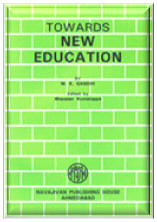
P.O. SEVAGRAM, DIST.WARDHA 442102, MS, INDIA. Phone: 91-7152-284753
FOUNDED BY MAHATMA GANDHI IN 1936
Towards New Education

TOWARDS NEW EDUCATION
Written by :M. K. Gandhi
Table of Contents
- PART I : INADEQUACY OF PREVAILING EDUCATION
- PART II : FORESHADOWING OF A NEW TYPE OF EDUCATION
- PART III : NEW EDUCATION
- PART IV : THE QUESTION OF RELIGIOUS EDUCATION
- PART V : THE LANGUAGE PROBLEM
- PART VI : COMPULSORY EDUCATION
- PART VII : EDUCATION OF SPECIAL GROUPS
- PART VIII : HIGHER EDUCATION
- Glossary
About This Book
Written by : M. K. Gandhi
Edited by : Bharatan Kumarappa
First Edition : October 1953
I.S.B.N : 81-7229-078-0
Printed and Published by : Jitendra T. Desai
Navajivan Mudranalaya,
Ahmedabad - 380 014,
India.
© Navajivan Trust, 1953
Download
PART III : NEW EDUCATION
Not Mere Text-Book Learning
Pupils to Learn Discrimination
Pupils should know to discriminate between what should be received and what rejected. It is the duty of the teacher to teach his pupils discrimination. If we go on taking in indiscriminately we would be no better than machines. We are thinking, knowing beings and we must in this period distinguish truth from untruth, sweet from bitter language, clean from unclean things and so on. But the student's path today is strewn with more difficulties than the one of distinguishing good from bad things. The rishis taught their pupils without books. They only gave them a few mantras which the pupils treasured in their memories and translated in practical life. The present day student has to live in the midst of heaps of books, sufficient to choke him.
Young India, 29-1-''25
Text-books
For India a multiplicity of text-books means eprivation of the vast majority of village children of the means of instruction. Text-books, therefore, in India must mean, principally and for the lower standards, text-books for teachers, not pupils. Indeed, I am not sure that it is not better for the children to have much of the preliminary instruction imparted to them vocally. To impose on children of tender age a knowledge of the alphabet and the ability to read before they can gain general knowledge is to deprive them, whilst they are fresh, of the power of assimilating instruction by word of mouth. Should, for instance, a lad of seven wait for learning the Ramayan till he can read it ? The results that we arrive at when we think of the few lakhs living in the cities of India are wholly different from those we obtain, we think, in terms of the millions of rural India.
Young India, 16-9-1926
Teachers and Text-books
There seems to me to be no doubt that in the public schools the books used, especially for children, are for the most part useless when they are not harmful. That many of them are cleverly written cannot be denied. They might even be the best for the people and the environment for which they are written. But they are not written for Indian boys and girls, not for the Indian environment. When they are so written, they are generally undigested imitations hardly answering the wants of the scholar. In this country, wants vary according to the provinces and the classes of children. For instance, wants of Harijan children are, in the beginning stages at least, different from those of the others.
I have, therefore, come to the conclusion that books are required more for the teachers than for the taught. And every teachers, if he is to do full justice to his pupils, will have to prepare the daily lesson from the material available to him. This, too, he will have to suit to the special requirements of his class.
Real education has to draw out the best from the boys and girls to be educated. This can never be done by packing ill-assorted and unwanted information into the heads of the pupils. It becomes a dead weight crushing all originality in them and turning them into mere automata. It we were not ourselves victims of the system, we would long ago have realized the mischief wrought by the modern method of giving mass education, especially in a case like India's.
Attempts have undoubtedly been made by many institutions to produce their own text-books with more or less success. But in my opinion they do not answer the vital needs of the country.
I lay no claim to originality for the views I have endeavoured to set forth here. They are repeated here for the benefit of the managers and teachers of Harijan schools, who have tremendous task before them. They dare not be satisfied with mere mechanical work resulting in simply making the children under their charge indifferently and in a parrot-like manner learn the books chosen anyhow. They have undertaken a great trust which they must discharge courageously, intelligently an honestly.
The task is difficult enough but not so difficult as one would imagine, provided the teacher or the manager puts his whole heart into the work. If he becomes a parent to his pupils, he will instinctively know what they need and set about giving it to them. If he has it not to give, he will proceed to qualify himself. And seeing that we have stated with the idea that the boys and girls have to have instruction in accordance with their wants, no extraordinary cleverness or possession of external knowledge is required in a teacher of Harijan and for that matter, any other children.
And when it is remembered that the primary aim of all education is, or should be, the moulding of the character of pupils, a teacher who has a character to keep need not lose heart.
Young India, 1-12-1933